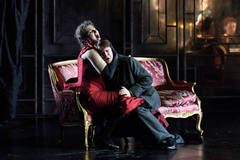| Opera Reviews | 2 May 2024 |
McVicar's Traviata is sumptuously minimalistby Catriona Graham |
|
| Verdi: La Traviata Scottish Opera November 2017 |
|
|
Marie Lambert directs Scottish Opera’s co-production with Welsh National Opera, Gran Teatre del Liceu and Teatro Real Madrid, of Sir David McVicar’s staging, in all its sumptuously minimalist glory. The set is monochrome, apart from a few red flowers. In Paris, black silk curtains hang in swags and the upholstery is black; in the country, the curtains are white voile and the bergère furniture is in shades of grey. In a nod to the origins of Verdi’s opera in Dumas’s story of the demi-monde, designer Tanya McCallin fills vases with camellias. The dresses at Violetta’s party are in rich, dark colours and the men are in evening dress. Alfredo, who has admired her from afar, is brought along by a friend – Peter Gijbertsen perfectly catches his youthful diffidence and his gaucheness in such sophisticated company, even manages to convey that in the Brindisi. He piques the interest of his hostess; Gulnara Shafigullina is excellent – already in failig health, Violetta’s conflicting emotions are well-conveyed. We next see the pair in a covetable bed, and it’s a different, confident Alfredo who sings of his joy in love. Appalled when he realises the implications of being a kept man, he goes to Paris to sort things out. While he is away, his father arrives to confront Violetta. Despite being somewhat overwhelmed by the orchestra at times (the tymps are particularly enthusiastic), Stephen Gadd is less pompous and more sympathetic than some portrayals of Giorgio Germont. From believing the worst of Violetta, his realisation that she is keeping his son rather than the other way round changes his heart, if not his mind. The scene between son and father, with father’s dawning realisation that Alfredo is no longer a boy but a man, is powerfully played. Not too grown-up, though, to get absolutely legless and cause a scene when Alfredo follows Violetta to her friend Flora’s party. Laura Zigmantaite is an effervescent and elegant Flora and at her party, the dresses are predominantly peachy-cream shades. She also has dancers for entertainment – Colm Seery’s choreography for gypsies, matador and bull is excellent. And so to the death-bed – a cacophony of audience coughing accompanying the Act 3 overture. Violetta is trying to stay alive till Alfredo and Giorgio arrive, Giorgio having written they are on their way. Faithfull maid Annina (Catherine Backhouse) and Dr Grenvil (James Platt) are under no illusions. They do arrive, of course, in time for Violetta and a much more mature Alfredo to sing of their love before she dies in his arms. Despite occasional imbalances between stage and pit, conductor David Parry brings out the lightness and longing in the music and controls the sound of a very effective chorus.
|
|
| Text ©
Catriona Graham Photo © Jane Hobson Photography |

 The bailiffs are in, valuing the few remaining bits of furniture. As the overture starts, a young man dressed in black walks on sombrely, leaves fall, and he stoops to pick one up. Even if you have never even heard the story of La Traviata, all the clues are there that the evening is not going to end well.
The bailiffs are in, valuing the few remaining bits of furniture. As the overture starts, a young man dressed in black walks on sombrely, leaves fall, and he stoops to pick one up. Even if you have never even heard the story of La Traviata, all the clues are there that the evening is not going to end well.






